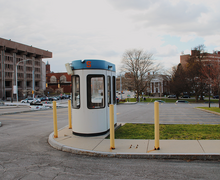Keeping the Faith
It is easy to understand why some students feel lost and let personal practices, like attending religious services, slip upon entering a campus with more than 19,000 students
‘It all happens at once. There’s no Mom, Dad or community to support you,’ said Linus DeSantis of the St. Thomas More Campus Ministry at Hendricks Chapel.
Without the drive from their community, students once heavily involved with local religious practices, stop practicing their particular faith. ‘Not everybody goes to church here,’ DeSantis said. ‘Nobody wants to go to church alone.’
‘From what I hear, it’s a lot easier to be religious at SU – it’s right there for you to find,’ said Jennifer Burrows from the Episcopal/Anglican Campus Ministry.
There are 10 different chaplaincies recognized on the Hendricks Chapel Web site. Religions from Roman Catholicism, to Buddhism, to Paganism, are represented, giving like-minded students ample amount of opportunity to come together and form a kinship similar to the ties they had at home. It’s about building community and finding ways,’ said Burrows.
While participating in a religious organization on campus is not the only way to find friends on campus, DeSantis said participating in a religious lifestyle could help students make discoveries about themselves and their priorities.
‘Don’t be a flag-flapping in the wind,’ he said. ‘Be yourself.’
Students who participate in a religious lifestyle on campus feel it gives them the skills to makes important decisions on a daily basis. ‘It makes me prioritize; I’m choosing to be here,’ said Caroline Godden, a sophomore communication design major. ‘It makes a difference on how you work as a college student.’
Participating in a chaplaincy does not mean students have to put faith in something they’re not sure they even believe in. Religions can be used as a moral blueprint to a student’s life as they make numerous life choices at SU.
‘Religion provides a framework to life,’ said DeSantis.
Buddhism, in particular, is a way life can be practiced without ever becoming religiously affiliated. ‘Buddhism emphasizes the investigation of what works for you and who you are,’ said Bonnie Shoultz, the Buddhist chaplaincy at Hendricks Chapel.
The cornerstone of understanding Buddhism, without actually being a Buddhist, is realizing the power of meditation practice. Buddhists consider meditation to be a useful way to relax and regain concentration. This activity might seem attractive to the overworked college student. By eliminating stress through meditation, students have an easier time handling college stress, Shoultz said.
Buddhism is one that is best practiced in larger communities, Shoultz said. ‘We encourage others to meditate in groups,’ she said. ‘It supports us not to move. (We) can’t get up and break concentration.’
However, being open about one’s faith on campus can sometimes be a social hindrance to religious students. ‘People have a tendency to link religiousness with conservatism,’ said Godden. ‘It’s hard, socially.’
Students can balance work in their lives while still contributing to the religious community. As long as a student can make it once a month to Mass, Burrows said, that can be considered devout.
‘That is also not knowing what they’re doing on their own time,’ Burrows said.
On the other hand, placing religion within the larger context of a college student’s life can sometimes require serious decision-making. ‘I don’t think it’s difficult if that’s what you believe in,’ said Jacob Hahn, a graduate piano student.
To participate in a socially-positive atmosphere, where honesty and respect are practiced, is a fundamental bonus, DeSantis said.
‘These aren’t Christian or Catholic values; they’re basic universal truths,’ DeSantis said. ansteinb@syr.edu
Published on September 8, 2009 at 12:00 pm





